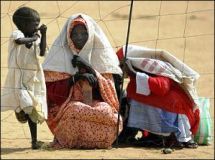Deadlocked council under mounting pressure to adopt new Sudan resolution
By EDITH M. LEDERER, Associated Press Writer
UNITED NATIONS, Mar 18, 2005 (AP) — After weeks of negotiations, the U.N. Security Council remains deadlocked on the next steps in Sudan where a 21-year civil war has just ended and a two-year conflict that has killed an estimated 180,000 people is still raging.

|
|
Sudanese refugees rest near a fence at the Abu Shouk refugee camp in Sudan’s Darfur region (AFP). |
The council is under mounting international pressure to act quickly but members are still divided over sanctions against the government and punishment for the perpetrators of atrocities.
At the request of the United States, the council voted Thursday for a second week-long extension of the U.N. political mission in Sudan. But many members including France, Algeria and Britain made clear they are fed up with the delays and want a vote next week on a new resolution.
“The time has come now to adopt the resolution,” said France’s U.N. Ambassador Jean-Marc de La Sabliere, stressing that the conflict in the western Darfur region is “very bad” and the council needs to act.
The U.S.-drafted resolution on the table would establish a broader U.N. mission and authorize a 10,000-strong U.N. peacekeeping force to monitor a peace accord ending the civil war between the government and southern rebels. It would also bolster efforts by the 2,200-strong African Union force in Darfur to promote peace.
Council members agree on these provisions though diplomats are concerned that the large U.N. peacekeeping force will be deployed in generally quiet areas monitoring the north-south peace deal while the much smaller African force is struggling on its own in Darfur to help end a conflict that has forced over 2 million people to flee their homes. But council members disagree on sanctions and punishment.
The U.S. draft resolution would impose a travel ban and asset freeze against those who block peace efforts, threaten stability in Darfur, violate international humanitarian or human rights law, or are responsible for military overflights. It also calls for those responsible for “crimes and atrocities” to be punished — but doesn’t specify how, saying this needs “to be developed.”
The United States dropped an earlier proposal to extend an arms embargo already in force in Darfur for both black African rebel groups and the Arab militia known as Janjaweed to include Sudan’s government. China, Russia and Algeria were opposed, according to U.N. diplomats, speaking on condition of anonymity.
But China’s U.N. Ambassador Wang Guangya has said his government has problems with “the whole concept of sanctions.” Diplomats said it’s still unclear whether Beijing or Moscow would veto a resolution that included a travel ban and asset freeze, or simply abstain.
The issue of punishing perpetrators of violence is equally divisive.
Two months ago, a U.N. Commission of Inquiry said crimes against humanity — but not genocide — probably occurred in Darfur and recommended that those responsible be prosecuted by the International Criminal Court. It drew up a secret list of top suspects.
Nine of the 15 council members including Britain and France are parties to the court and three others have signed but not ratified the treaty establishing it. But the United States vehemently opposes the world’s first permanent war crimes tribunal and wants suspects to be tried by a new tribunal in Arusha, Tanzania.
This proposal, however, has received little support. Neither has a Nigerian proposal made Wednesday for an African-run tribunal to prosecute human rights violators from Darfur and promote reconciliation.
“I don’t think it’s going to happen,” Britain’s U.N. Ambassador Emyr Jones Parry said, noting questions about the extent of African Union support for the Nigerian proposal and “lots of skepticism whether or not this is a practical and realistic alternative.”
France’s de La Sabliere said the International Criminal Court is the right place for prosecutions, though a reconciliation committee could be created as an addition.
In recent closed-door negotiations, diplomats said, supporters of the International Criminal Court offered to include a provision in the resolution which would bar any prosecution of Americans — but the United States turned this down.
The United States, instead, is pressing for the council to vote on the peacekeepers and sanctions but leave the issue of a tribunal to a later date, diplomats said, speaking on condition of anonymity.
De La Sabliere and other council members, however, are insisting on four elements in the resolution: peacekeepers, support for the African Union force in Darfur, sanctions, and impunity.
“We need to take a decision next week on the omnibus resolution on Sudan,” said Algeria’s U.N. Ambassador Abdallah Baali.
Brazil’s U.N. Ambassador Ronaldo Mota Sardenberg, the current council president, said members must make a special effort because of the serious situation in Darfur and enormous international interest.
“Originally the idea was to adopt a resolution in the month of February,” he said. “Of course, it’s a matter of concern if it goes beyond March.”
